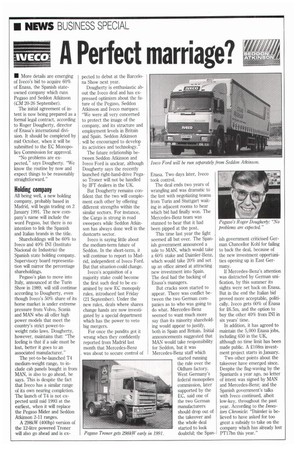A Perfect marriage?
Page 14

If you've noticed an error in this article please click here to report it so we can fix it.
• More details are emerging of Iveco's bid to acquire 60% of Enasa, the Spanish stateowned company which runs Pegaso and Seddon Atkinson (CM 20-26 September).
The initial agreement of intent is now being prepared as a formal legal contract, according to Roger Dougherty, director of Enasa's international division. It should be completed by mid October, when it will be submitted to the EC Monopolies Commission for approval.
"No problems are expected," says Dougherty. "We know the routine by now and expect things to be reasonably straightforward."
Holding company
All being well, a new holding company, probably based in Madrid, will begin trading on 2 January 1991. The new company's name will include the word Pegaso, but there is no intention to link the Spanish and Italian brands in the title.
Shareholdings will be 60% to lveco and 40% INI (Institut° Nacional de Industria) the Spanish state holding company. Supervisory board representation will mirror the percentage shareholdings.
Pegaso's plan to move into Italy, announced at the Turin Show in 1989, will still continue according to Dougherty, even though Iveco's 50% share of its home market is under extreme pressure from Volvo, Scania and MAN who all offer high power models that meet the country's strict power-toweight ratio laws. Dougherty, however, maintains that: "The feeling is that if a sale must be lost, better it goes to an associated manufacturer."
The yet-to-be-launched 14 medium-weight range, to include cab panels bought in from MAN, is also to go ahead, he says. This is despite the fact that Iveco has a similar range of its own nearing completion. The launch of T4 is not expected until mid 1993 at the earliest, when it will replace the Pegaso Mider and Seddon Atkinson 2-11 ranges.
A 298kW (400hp) version of the 12-litre powered Troner will also go ahead and is ex
pected to debut at the Barcelona Show next year.
Dougherty is enthusiastic about the Iveco deal and has expressed optimism about the future of the Pegaso, Seddon Atkinson and Iveco marques: "We were all very concerned to protect the image of the company, and its structure and employment levels in Britain and Spain. Seddon Atkinson will be encouraged to develop its activities and technology."
The future relationship between Seddon Atkinson and Iveco Ford is unclear, although Dougherty says the recently launched right-hand-drive Pegaso Troner will not be handled by IFT dealers in the UK.
But Dougherty remains confident that the two will complement each other by offering different strengths within the similar sectors. For instance, the Cargo is strong in road sweepers while Seddon Atkinson has always done well in the dustcarts sector.
Iveco is saying little about the medium-term future of Seddon. In the short-term, it will continue to report to Madrid, independent of Iveco Ford. But that situation could change.
Iveco's acquisition of a majority stake could become the first such deal to be examined by new EC monopoly rules, introduced last Friday (21 September). Under the new rules, deals where shares change hands are now investigated by a special department which has the power to veto big mergers.
For once the pundits got it wrong when they confidently reported from Madrid last month that Mercedes-Benz was about to secure control of Enasa. Two days later, Iveco took control.
The deal ends two years of wrangling and was dramatic to the last with negotiating teams from Turin and Stuttgart waiting in adjacent rooms to hear which bid had finally won. The Mercedes-Benz team was stunned to hear that it had been pipped at the post.
This time last year the fight seemed all but over. The Spanish government announced a sale to MAN, which would take a 60% stake and Daimler-Benz, which would take 20% and set up an office aimed at attracting new investment into Spain. The deal had the backing of Enasa's managers.
But cracks soon started to appear. There was conflict between the two German companies as to who was going to do what. Mercedes-Benz seemed to want much more say than its minority shareholding would appear to justify, both in Spain and Britain. Initial announcements suggested that MAN would take responsibility for Seddon, but it was Mercedes-Benz staff which started running the rule over the Oldham factory. West Germany's federal monopolies commission, later supported by the EC, said one of the two German manufacturers should drop out of the takeover and the whole deal started to look doubtful; the Span ish government criticised German Chancellor Kohl for failing to back the deal, because of the new investment opportanities opening up in East Germany.
If Mercedes-Benz's attention was distracted by German unification, by this summer its sights were set back on Enasa. But in the end the Italian bid proved more acceptable, politically. Iveco gets 60% of Enasa for £6. 5m, and the option to buy the other 40% from INI in six years' time.
In addition, it has agreed to maintain the 5,000 Enasa jobs, including 650 in the UK, although no time limit has been made public. A 2108m investment project starts in January.
Two other points about the takeover have emerged since. Despite the flag-waving by the Spaniards a year ago, no letter of intent was signed by MAN and Mercedes-Benz; and the Spanish government's talks with Iveco continued, albeit low-key, throughout the past year. According to the Investors Chronicle: "Daimler is believed to have asked for too great a subsidy to take on the company which has already lost PT17bn this year."
































































































